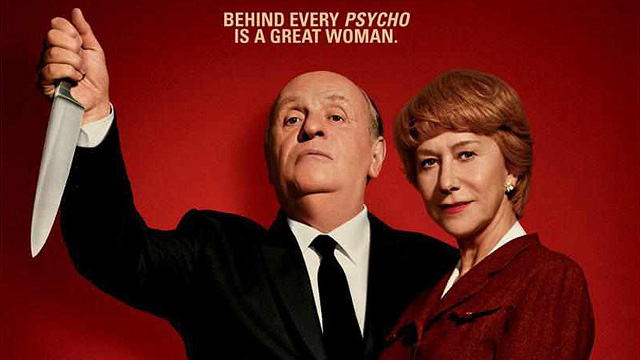SUMMARY
This is AI generated summarization, which may have errors. For context, always refer to the full article.

MANILA, Philippines – Having watched “Hitchcock” which focused on the master director’s “Pyscho,” I got to thinking about how much we are willing to forgive a film’s flaws.
For sure, “Psycho” is a masterwork, but it has a terribly flawed ending. (If you haven’t seen “Psycho” yet, spoilers follow.)
While the revelation of Norman and Norman’s mother is still extremely effective due to the shots and editing that the film employs, the flaw happens after. Once Norman is apprehended and jailed, we get a chilling shot of him. You can see the contained madness, all kinds of crazy just below the surface of the innocent-looking childlike face. This sends shivers up the spine.
But then the Great Flaw occurs. A psychiatrist comes in and explains everything. It becomes a straight up talking heads lecture about psychosis and dissociative personality disorder. The argument that is sometimes made for this is that the audience of the time needed this explanation. They had to be educated about what had happened to Norman Bates, and this was the only way.
Watch Alfred Hitchcock explain his filmmaking technique and “Psycho”:
To this I say two things:
First off, even if this were the case, there had to be some better way than the info dump. Perhaps one of our readers can enlighten us on the production concerns of the film. Did the studio or censors demand that this be tacked on, in the same way that in the ’90s and early ’00s certain films shown locally would have tacked on text explaining how despite the robbers getting away at the end of the film, they would be apprehended and have to pay for their crimes?
Second is that while it provides a rational explanation for the actions of Norman Bates, it diminishes the sheer terror of the events. It’s like our fears have to be assuaged as we leave the film behind us. Again, this might have been a function of the period, when viewers were shocked by the film. Now though, it ruins the experience.
Still, I love “Psycho.” On DVD I can just stop the flick and end where I think it’s still good. But it doesn’t ruin the overall greatness of the film; it just shows that masterpieces can have major flaws.
The question here is, if something has a terrible ending, or an ending that messes things up, can we still like it? I ask this question often in relation to a number of Spielberg flicks too — “Minority Report,” “AI” and “War of the Worlds” — which on the whole are brilliant, but I feel would have benefitted from shaving off the last few minutes of each.
Granted there are some readings that would explain why the Spielberg films ended the way they did, but I feel like the emotional force of those movies was blunted by the seemingly happy endings that they were saddled with.
I am racking my brains to think of a movie that is great, but that has a terrible ending that I just can’t live with. Some endings are confusing. Some are unsatisfying. Some are downright depressing. But good endings can be all those things. They don’t have to resolve the film, they don’t have to tie things up in a neat little bow.
Aside from “Psycho,” I can’t think of other movies whose endings I despise, and yet I still love them as films. I can think of other media that have endings that spoil the experience.
What quickly comes to mind is the weak ending of “Battlestar Galactica” (BSG), a show that for the larger part of the time that it was running was probably the best thing on TV. But its 4th and last season started showing flaws in vision and its finale was far from satisfying. While I love “Lost,” a good number of people also were unhappy with its ending, ditto “The Sopranos.”
BSG broke my heart with its inability to bring things to a good end thematically, and my memories and enjoyment of that show will always be marred by that ending. On the other hand, I did actually like the endings of the latter two shows, despite the strong backlash against them.
Another ending that enraged lots of people, myself included, was the ending to “Mass Effect 3.” Capping off the video game trilogy which promised so much to gamers and asked us for so much time (I played through the first two games at least 3 times each game, devoting more than 100 hours of my life to that series) we were given a no-win ending, an ending that fell way out of character with what the series had built, and basically betrayed the faith that people had instilled in the narrative.
This, after one of the best game experiences in “Mass Effect 3.” I mean, that was just an outstanding, groundbreaking game, taking all the best elements of previous games and bringing them to another level. But then the ending made me want to destroy something out of frustration. A masterwork spoiled by a weaksauce ending.
The time investment of film is obviously much smaller than TV and video games, and thus I suppose the sense of disappointment and betrayal would not be comparable. In that case, it is much easier to overlook certain flaws and disappointments, because the investment has not been as large.
I wonder though, what is it that we can overlook? What do we try to forget? How much can we forgive a movie and the way it runs? Hitchcock can definitely be forgiven the lapse that occurs in the last few minutes of “Psycho.” But do we find this problem in contemporary film? – Rappler.com
Carljoe Javier doesn’t know why people think he’s a snarky film critic who spends his time dashing the hopes of filmgoers. He thinks he’s not all that bad, really. He teaches at the State U, writes books, and studies film, comics, and video games… Then again, those people could be right.
Add a comment
How does this make you feel?

There are no comments yet. Add your comment to start the conversation.